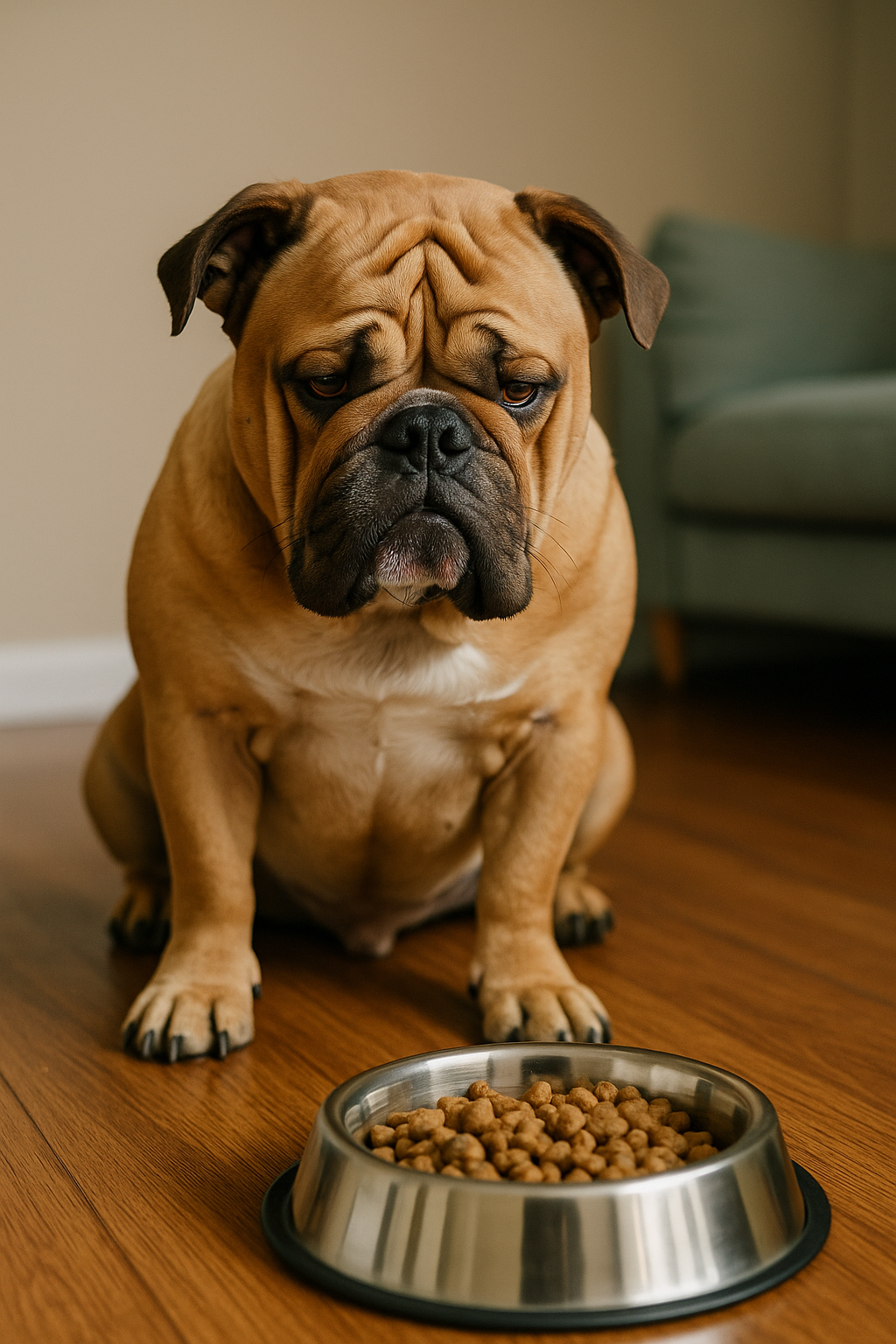A bulldog’s appetite is generally stable. This breed usually eats well and with enthusiasm. That’s why, when a bulldog refuses food, many owners become concerned — and rightly so. A loss of appetite might be caused by something simple, like a change in environment or routine, but it can also be a sign of health issues.
In this article, you’ll understand the possible reasons why your bulldog may stop eating and learn what to do to safely and healthily stimulate their appetite.
Observe Their Behavior Carefully
Before taking any action, observe how long your bulldog has gone without eating and whether there are any associated symptoms. This will help determine if it’s a one-off situation or something that needs immediate veterinary attention.
Ask yourself:
Is your bulldog refusing only dry food, or all types of food?
Is it drinking water normally?
Are there any signs of vomiting, diarrhea, lethargy, or fever?
Does it show signs of pain when chewing?
Is its behavior otherwise normal despite not eating?
If refusal to eat lasts more than 24 to 48 hours, or if other symptoms are present, contact your vet.
Common Causes of Appetite Loss in Bulldogs
There are several reasons why a bulldog may stop eating. The most frequent include:
- Changes in Routine or Environment
Bulldogs are creatures of habit. Changes like travel, guests at home, renovations, moving furniture, or the absence of a family member can make them feel anxious or uncomfortable, which affects their appetite. - Excessive Heat
On very hot days, it’s normal for bulldogs to eat less. Heat affects their metabolism and reduces the desire to eat, especially if food is offered during the hottest hours. - Stress or Anxiety
Emotional changes also influence appetite. A bulldog that feels lonely, jealous, insecure, or bored may lose interest in food. - Sudden Change of Food
Switching brands or types of food without a gradual transition can lead to rejection due to the taste, texture, or digestive upset. - Pain or Health Problems
Dental issues, abdominal pain, nausea, infections, or chronic conditions can reduce appetite. In such cases, the bulldog usually shows other signs like apathy, excessive drooling, or isolation. - End of Heat Cycle (in Females)
After their heat cycle, female bulldogs may become calmer and temporarily lose their appetite.
What to Do to Stimulate Eating
If there are no severe symptoms, you can try some strategies to encourage eating:
- Offer Food During Cooler Times
In hot weather, serve meals in the morning or late afternoon when it’s cooler. Make sure the feeding area is shaded, away from direct sunlight and hot surfaces. - Lightly Warm Wet Food
If you use wet food (or want to mix it with dry kibble), warm it slightly in the microwave for about 10 seconds to enhance the aroma. This can make it more appealing. - Use Natural Snacks as Toppers
Mix small pieces of cooked chicken (unseasoned), grated carrot, or boiled egg with the kibble to spark interest. Be cautious not to overdo it — the idea is to stimulate, not replace a balanced diet. - Reduce Treats During the Day
If your bulldog gets too many treats, it may not be hungry at mealtime. Cut back on snacks between main meals. - Feed in a Calm Environment
Create a peaceful setting during meals. Avoid loud noises, people walking around, or other animals nearby. This reduces distractions and anxiety. - Remove Food After 20 Minutes
If your bulldog doesn’t eat, take the food away and offer it again at the next scheduled mealtime. This helps establish a routine and discourages grazing or picky eating habits.
When to See the Vet
Some signs indicate that appetite loss may be due to a medical condition. Take your bulldog to the vet if:
It hasn’t eaten anything for over 48 hours
There’s vomiting or diarrhea
It appears very lethargic or sad
It has a fever or visible inflammation
It drools excessively or shows pain while chewing
It’s rapidly losing weight
The sooner the cause is diagnosed, the easier the treatment will be.
Avoid Forcing Your Dog to Eat
Never try to force-feed your bulldog by hand or putting food directly into its mouth. This can cause trauma and worsen the situation. The goal is to encourage eating positively and respect your dog’s pace.
Consider Adjusting the Diet
If appetite issues are frequent and not caused by medical problems, it might be time to review their diet. Speak with your vet about switching to a higher-quality food, one specifically formulated for bulldogs or with more appealing flavor and texture.
There are also specialized formulas for picky eaters with enhanced aromas and textures to make the food more enticing.
Conclusion: Appetite Reflects Health
Your bulldog’s eating habits are directly connected to their physical and emotional health. When they refuse food, it’s a sign that something is out of balance. It could be something minor or something more serious — that’s why careful observation and appropriate action make all the difference.
With patience, positive reinforcement, and professional guidance if needed, you can restore your bulldog’s appetite and ensure they eat well and enjoy their meals.
